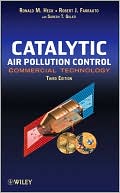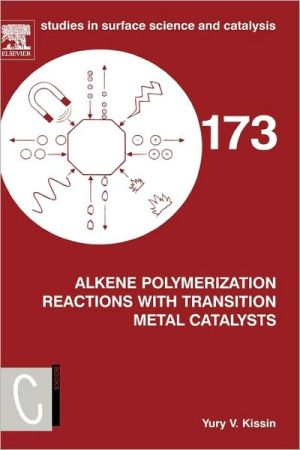Advances in Fischer-Tropsch Synthesis, Catalysts, and Catalysis
Rising oil costs have stimulated significant interest in the Fischer-Tropsch synthesis (FTS) as a method for producing a synthetic petroleum substitute. Drawn from the proceedings at a symposium held during the 236th meeting of the American Chemical Society in Philadelphia in August 2008, Advances in Fischer-Tropsch Synthesis, Catalysts, and Catalysis explores the recent developments in Fischer-Tropsch technology, which holds great promise in the area of renewable resources.\ Expert...
Search in google:
Rising oil costs have stimulated significant interest in the Fischer-Tropsch synthesis (FTS) as a method for producing a synthetic petroleum substitute. Drawn from the proceedings at a symposium held during the 236th meeting of the American Chemical Society in Philadelphia in August 2008, Advances in Fischer-Tropsch Synthesis, Catalysts, and Catalysis explores the recent developments in Fischer-Tropsch technology, which holds great promise in the area of renewable resources.Expert contributors explore a range of issuesThe book focuses on three main themes: catalyst preparation and activation, reaction mechanism, and process-related topics. A panel of expert contributors discusses synthesis of catalysts, carbon nanomaterials, nitric oxide calcinations, the influence of carbon, catalytic performance issues, chelating agents, and Cu and alkali promoters. They also explore Co/silica catalysts, thermodynamic control, the Two Alpha model, co-feeding experiments, internal diffusion limitations, Fe-LTFT selectivity, and the effect of co-fed water. Lastly, the book examines cross-flow filtration, kinetic studies, reduction of CO2 emissions, syncrude, and low-temperature water-gas shift.Attaining the maximum catalytic activity and catalyst lifeThe themes explored in the book demonstrate that while the Fischer-Tropsch synthesis (FTS) has advanced in maturity, many issues remain concerning the preparation of increasingly active catalysts and the method of activation to attain the maximum catalytic activity and catalyst life. The book includes coverage of the structural features, their changes, and the application of increasingly sophisticated characterization techniques, shedding light on the reaction mechanism and providing a glimpse into the processes and reaction rates under realistic commercial process conditions.
Preface xiiiThe Editors xvContributors xviiChapter 1 Synthesis of High Surface Area Cobalt-on-Alumina Catalysts by Modification with Organic Compounds Peter R. Ellis David James Peter T. Bishop John L. Casci C. Martin Lok Gordon J. Kelly 1Chapter 2 Carbon Nanomaterials as Supports for Fischer-Tropsch Catalyst Anke Jung, C. Kern Andreas Jess 17Chapter 3 Effect of a Novel Nitric Oxide Calcination on the Catalytic Behavior of Silica-Supported Cobalt Catalysts during Fischer-Tropsch Synthesis, and Impact on Performance Parameters Wenping Ma Gary Jacobs Muthu K. Gnanamani Uschi M. Graham\|cBurtron H. Davis 31Chapter 4 The Formation and Influence of Carbon on Cobalt-Based Fischer-Tropsch Synthesis Catalysts: An Integrated Review Danzil J. Moodley Jan van de Loosdrecht Abdool M. Saib Hans J. W. Niemantsverdriet 49Chapter 5 Catalytic Performance of Ru/Al2O3 and Ru/Mu/Al2O3 for Fischer-Tropsch Synthesis Mohammad Nurunnabi Kazuhisa Murata Kiyomi Okabe Megumu Inaba Isao Takahara 83Chapter 6 Preparation of Highly Active Co/SiO2 Catalyst with Chelating Agents for Fischer-Tropsch Synthesis: Role of Chelating Agents Naoto Koizumi Daichi Hongo Yukiya Ibi Yasuhiko Hayasaka Muneyoshi Yamada 95Chapter 7 Fischer-Tropsch Synthesis: Temperature-Programmed EXAFS/XANES Characterization of the Impact of Cu and Alkali Promoters to Iron-Based Catalysts on the Carbide Formation Rate Gary Jacobs Amitava Sarkar Burtron H. Davis Donald Cronauer A. Jeremy Kropf Christopher L. Marshall 119Chapter 8 Characterization of Co/Silica Catalysts Prepared by a Novel NO Calcination Method Gary Jacobs Wenping Ma Yaying Ji Syed KhalidBurtron H. Davis 147Chapter 9 Fischer-Tropsch Synthesis and Hydroformylation on Cobalt Catalysts: The Thermodynamic Control Hans Schulz 165Chapter 10 The Value of a Two Alpha Model in the Elucidation of a Full Product Spectrum for Fe-LTFT Johan Huyser Matthys Janse van Vuuren Godfrey Kupi 185Chapter 11 Studies on the Reaction Mechanism of the Fischer-Tropsch Synthesis: Co-Feeding Experiments and the Promoter Effect of Alkali Johann Gaube Hans-Friedrich Klein 199Chapter 12 Modeling of Internal Diffusion Limitations in a Fischer-Tropsch Catalyst Anke Jung C. Kern Andreas Jess 215Chapter 13 Fe-LTFT Selectivity: A Sasol Perspective Matthys Janse van Vuuren John Huyser Thelma Grobler Godfrey Kupi 229Chapter 14 Fischer-Tropsch Synthesis: Comparison of the Effect of Co-Fed Water on the Catalytic Performance of Co Catalysts Supported on Wide-Pore and Narrow-Pore Alumina Amitava Sarkar Gary Jacobs Peter Mukoma David Glasser Diane Hildebrandt Neil J. Coville Burtron H. Davis 243Chapter 15 Fischer-Tropsch Synthesis: A Continuous Process for Separation of Wax from Iron Nano-Catalyst Particles by Using Cross-Flow Filtration Amitava Sarkar James K. Neathery Robert L. Spicer Burtron H. Davis 269Chapter 16 Detailed Kinetic Study and Modeling of the Fischer-Tropsch Synthesis over a State-of-the Art Cobalt-Based Catalyst Carlo Giorgio Visconti Zuzana Ballova Luca Lietti Enrico Tronconi Roberto Zennaro Pio Forzatti 293Chapter 17 Reduction of CO2 Emissions from CTL Processes: Use of a Novel FT-Based Chemistry Diane Hildebrandt David Glasser Bilal Patel 317Chapter 18 Refining Fischer-Tropsch Syncrude: Perspectives on Lessons from the Past Arno de Klerk 331Chapter 19 Low-Temperature Water-Gas Shift: Assessing Formates as Potential Intermediates over Pt/ZrO2 and Na-Doped Pt/ZrO2 Catalysts Employing the Ssitka-Drifts Technique Gary Jacobs Burtron H. Davis John M. Pigos Christopher J. Brooks 365Index 395








